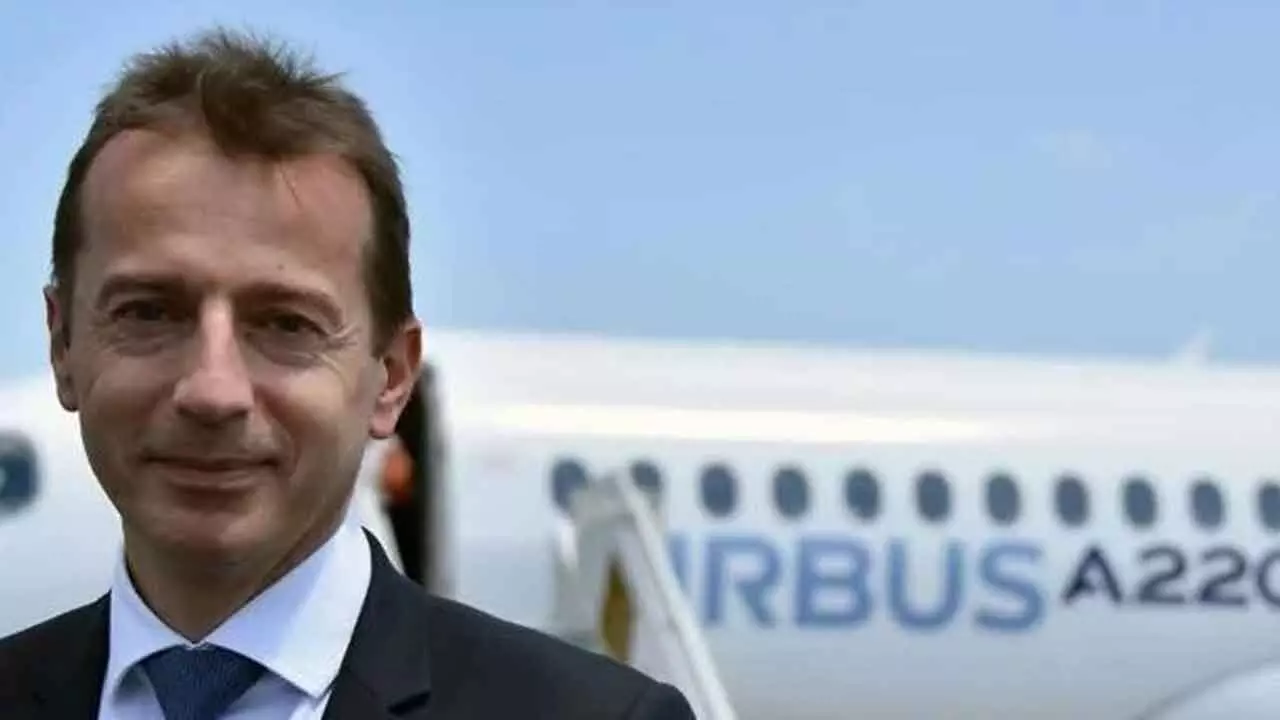Can Supply Chain Woes Impacting The Global Aviation Industry Boost Indian Exports?
Raising production rates will be a ‘complex’ challenge for suppliers: Airbus CEO
Can Supply Chain Woes Impacting The Global Aviation Industry Boost Indian Exports?

India’s integration into the global aerospace sector is evident as Airbus continues to expand its sourcing across various categories, including parts, sub-system manufacturing, airframes, and highly-loaded components
Aircraft manufacturer Airbus is set to ramp up its annual sourcing of components and services from India, increasing the value to $2 billion before 2030.
The two companies putting the most pressure on the aviation supply chain are Airbus and Boeing. And each presents a particular challenge to suppliers of parts, many of which feed the manufacturing lines of both companies’.
Airbus is aware of the supply-chain challenges, but ramping up narrow-body aircraft production is at “the heart of our priorities,” Airbus CEO Guillaume Faury has said.
He conceded that raising production rates will be a “complex” challenge for suppliers. “We see difficulties with raw materials, with logistics, with cost of energy and also with hiring people back across the globe,” Faury said.
Airbus is planning to ramp up its A320 family aircraft production rate from 45 per month in the 2021 fourth quarter to 65 per month by the middle of 2023, and is considering going all the way to 70-75 per month by 2024. This is a steep slope for the company’s supply chain.
This move underscores India's growing importance in Airbus’ global supply chain, CEO Guillaume Faury said. Currently, Airbus procures around $1.4 billion worth of components and services from India, a country that is emerging as one of the fastest-growing civil aviation markets worldwide, reported PTI.
Faury emphasised that India should leverage its strengths rather than replicate existing aerospace models. He highlighted that a key challenge for Airbus is to align with the rapid expansion of India's aviation sector.
Airbus' order backlog and presence in India makes for a study in contrasts. The company has a backlog of over 1,300 aircraft destined for Indian airlines, with IndiGo alone accounting for more than 900 of these orders, including the wide-body A350s. Additionally, Air India has placed firm orders for 50 A350s, while IndiGo has secured 30 of the same model. Currently, approximately 700 Airbus aircraft are operational within India.
India’s integration into the global aerospace sector is evident as Airbus continues to expand its sourcing across various categories, including parts, sub-system manufacturing, airframes, and highly-loaded components.
“We are growing the supply base, we are procuring $1.2 to $1.3 billion worth of components and services from India today, and we will be at around $2 billion before 2030,” Faury stated during an interaction with Indian journalists at the Airbus Summit 2025 in Toulouse.
With over 3,600 employees across its Indian sites and more than 15,000 jobs supported through its supply chain, Airbus has built a strong presence in the country.
Faury noted that India’s competitive edge lies in its ability to re-engineer and optimise sophisticated aerospace systems.
“That is what we are doing with Dynamatic, Tatas, and Mahindra,” he added.
Last year, Bengaluru-based Dynamatic Technologies was awarded the contract to manufacture and assemble doors for Airbus’ A220 Family aircraft. The company is also involved in other ventures like a Final Assembly Line (FAL) for C295 military transport aircraft in partnership with Tata and plans for an H125 helicopter assembly facility in India. On the possibility of setting up a Final Assembly Line for civilian aircraft in India, Faury suggested that such a facility might be considered for the next generation of aircraft.
“For the current generation of aeroplanes, I don’t think it makes sense for Airbus or for India. India should play on its strengths and not try to replicate what others have been doing in the past,” he stated. Instead, he stressed that India's strengths in engineering, IT, systems, and software offer mutual benefits for both Airbus and the country.
Addressing concerns about supply chain constraints leading to longer aircraft delivery times, Faury noted that the situation is improving.
Boeing, on the other hand, has had well documented difficulties with its 737 MAX and 787 programs. The MAX reentered service last year after two fatal accidents led to a lengthy grounding, but new 787 deliveries remain suspended, though hundreds of previously delivered 787s are in service with airlines around the world. Further complicating the return of 787 deliveries was the FAA’s announcement in February that the agency–not Boeing–will be clearing each new 787 before it is delivered.
Long delays in 737 and 787 production present two main challenges for suppliers: Boeing has a huge overhang of already-built parts in inventory and, with 787 there is a lack of certainty around future production.

